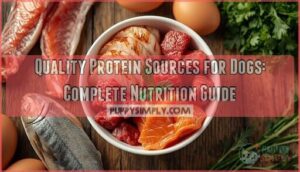This site is supported by our readers. We may earn a commission, at no cost to you, if you purchase through links.

No worries, let’s untangle it! Different breeds have distinct needs. Some puppies need extra joint support, while others might demand more protein for their tiny powerhouses.
It’s like a tailor making the perfect suit, just in kibble form!
Seek formulas aligned with your pup’s activity level, size, and unique health demands.
Curious about tailoring nutrition just right? There’s more to chew on in terms of puppy nutrition adventures!
Table Of Contents
- Key Takeaways
- Choosing the Right Puppy Food
- Large Breed Puppy Food Formulas
- Key Ingredients for Joint Health and Development
- Benefits of Glucosamine and Chondroitin
- Natural Sources of Glucosamine in Puppy Food
- Importance of Omega-3 Fatty Acids for Brain Development
- High-Calorie Needs for Small Breed Puppies
- Importance of Protein-Rich Ingredients
- Benefits of Prebiotics and Probiotics for Gut Health
- Small Kibble Size for Easy Digestion
- Feeding Your Puppy
- Transitioning to Adult Food
- Nutritional Needs of Puppies
- Breed-Specific Nutritional Needs
- Common Mistakes in Feeding Puppies
- Frequently Asked Questions (FAQs)
- Can you mix puppy formula with puppy food?
- What is the difference between large breed puppy food and regular puppy food?
- How do you calculate puppy formula?
- What is the best ratio for puppy food?
- What are the benefits of breed-specific puppy food?
- How to select breed-specific food for mixed breeds?
- Are there disadvantages to breed-specific puppy formulas?
- How do breed-specific foods address health concerns?
- What ingredients differentiate breed-specific puppy foods?
- Conclusion
Key Takeaways
- Different puppy breeds have unique nutritional needs, so you’ll want to choose a formula tailored to your pup’s size, activity level, and health factors – it’s like finding the perfect pair of shoes.
- Large and giant breed puppies need extra support for their rapid growth and developing joints, so look for ingredients like glucosamine, Omega-3s, and the right calcium-phosphorus ratio to keep those big paws happy.
- Small breed puppies have speedy metabolisms, so their food should pack more calories per cup in a smaller kibble size that’s easy for their tiny mouths to chew – no more wrestling matches at mealtime.
- Consistency is key when feeding your pup – stick to a schedule, monitor calorie intake, and make gradual transitions to adult food. Your puppy’s tummy will thank you by keeping those wags coming.
Choosing the Right Puppy Food
Choosing the right puppy food feels like searching for the perfect pair of shoes; each breed has its own unique nutritional needs. So, you’re the wise shopper who’ll pick a breed-specific formula to support those growing paws, following trusted AAFCO guidelines for safety and health.
Factors to Consider for Breed-Specific Formulas
Choosing the right puppy food can feel like sorting through a jumble, but considering key factors simplifies the process. Focus on:
- Size Matters: Match food to breed size; small and large breeds have different needs.
- Lifestyle Counts: Puppies with higher activity levels need more energy.
- Health and Age Factors: Tailor diets to growth rates and prevent skeletal malformations, especially in larger breeds.
Nutritional Needs of Large and Giant Breed Puppies
Understanding the nutritional needs of large and giant breed puppies is like solving a puzzle. These pups aren’t just bigger; they grow quickly and need specific nutrients to support joint health and proper bone development. Keep an eye on their growth rate and calorie intake to avoid food sensitivities. The right puppy food helps them scale their growth curve gracefully!
Small Breed Puppy Food Formulas
For small breed puppies, specialized small breed puppy food formulas are essential. These formulas feature a smaller kibble size that’s easier for tiny mouths to chew, along with higher energy density to meet the rapid metabolism of small pups. Look for small breed options that also support dental health and digestive issues.
Importance of AAFCO Guidelines in Puppy Food
Choosing the right puppy food isn’t just about taste—it’s like choosing the right fuel for a race car. AAFCO guidelines help you make sure you’re not barking up the wrong tree by confirming:
- Nutritional balance
- Ingredient quality
- Regulatory standards
- Safe, grain-inclusive formulas
- Proper choline chloride, DL Methionine levels
They’re your roadmap to puppy food safety and health!
Large Breed Puppy Food Formulas
If you’ve got a large breed puppy, their food needs to support big joints and even bigger appetites. Don’t chew over it; the right formula is loaded with the nutrients they need for healthy growth and development.
Key Ingredients for Joint Health and Development
Looking for medium breed puppy food that looks out for joint health? Your furry friend’s diet should include supportive ingredients. Reach for those with glucosamine, Omega-3 fatty acids, chicken meal, flax seeds, and menhaden fishmeal. It’s like giving their joints a spa day—or at least a comfy cushion! Here’s what you should consider:
| Ingredient | Benefit |
|---|---|
| Glucosamine | Joint support |
| Omega-3s | Anti-inflammatory |
| Chicken Meal | Protein source |
| Flax Seeds | Omega-rich |
| Menhaden Fishmeal | Heart health boost |
Benefits of Glucosamine and Chondroitin
Two key compounds, glucosamine and chondroitin, are like a dynamic duo for supporting your pup’s growing joints. They work hand-in-hand to nourish cartilage, reduce inflammation, and keep those limbs limber as your furry friend bounds through puppyhood. With these joint-boosting nutrients, you can help make sure their adventures never slow down.
Natural Sources of Glucosamine in Puppy Food
When it comes to glucosamine-rich ingredients, you might find that shellfish sources like shrimp and crab offer great benefits for joint health. These natural sources outshine supplements in puppy food for goldendoodles. Mixing a feeding guide with glucosamine means smoother romps in the park! Remember, pairing Vitamin E and C with natural chicken flavor creates a tasty, health-boosting dish for your pup.
Importance of Omega-3 Fatty Acids for Brain Development
Now, imagine your pup’s brain as a sponge. Omega-3 fatty acids, like those in omega-rich fish oil, transform this sponge into a super-absorbent powerhouse, supporting brain development and cognitive function. Want a smarter, more alert puppy? Include DHA-rich foods in their diet. Fish oil isn’t just for brainy pups; it also promotes strong teeth and overall puppy nutrition.
High-Calorie Needs for Small Breed Puppies
For small breed puppies, think of their metabolism as a speedy little engine! Their high energy levels require a diet rich in kcal/cup to support growth. Manage their weight by carefully portioning food and sticking to a puppy feeding schedule. Frequent meals, whether dry or wet puppy food, help keep them fueled without overfeeding concerns. Balance is key!
Importance of Protein-Rich Ingredients
As a new puppy owner, you’ll want to prioritize protein-rich ingredients in their food. High-quality proteins like chicken, lamb, or fish meal support healthy muscle growth and development. Look for formulas that also include brewers dried yeast, chicken fat, and dried tomato pomace – these nutrient-dense ingredients promote energy levels and a shiny coat.
Benefits of Prebiotics and Probiotics for Gut Health
Building a puppy’s gut health is like constructing a sturdy house—start with a solid foundation. Including prebiotics and probiotics in dog food promotes:
- Digestive health: Helps keep the tummy running smoothly.
- Balanced gut bacteria: The secret to a happy belly.
- Immune system boost: Like a shield, but tastier.
- Prevention of puppy diarrhea: Avoids messy mishaps.
Your pup will thank you with happy wags!
Small Kibble Size for Easy Digestion
Small kibble size is a game’s best play when easing digestion. Puppies sometimes tackle kibble like it’s a wrestling match, but smaller pieces prevent puppy choking and digestion issues. NutriSource offers breed-specific kibble sizes, boosting dental health and nutrition. Let your furball enjoy munching on manageable kibbles, ensuring their meal isn’t a choke-risk but a delightful chew experience.
Feeding Your Puppy
Feeding your puppy the right amount at consistent times is like setting the perfect playlist—get it right, and you’ll hit all the right notes for healthy growth. By monitoring their caloric intake and avoiding overfeeding, you’re on track to raising a puppy that’s as energetic as it’s well-fed!
Feeding Frequency and Schedule
Puppies typically need to be fed 2-3 times per day, with their total daily intake divided into smaller meals. This helps support their rapid growth and development. As your puppy ages, you can gradually switch to a twice-daily feeding schedule. Stick to a consistent mealtime routine to help your pup feel secure and comfortable.
- Feed puppies 2-3 times per day
- Divide total daily intake into smaller meals
- Switch to twice-daily feeding as puppy ages
- Maintain a consistent mealtime routine
Importance of Consistent Feeding Times
Establishing consistent feeding times for your puppy is like setting a clock for their tummy. A regular schedule helps maintain a routine, reducing stress and promoting digestive health. It’s much like when you expect breakfast at 8 a.m., not noon! Puppies thrive on predictability, aiding in weight control and forming healthy habits. Remember, they’ll appreciate the Pro Plan!
Monitoring Caloric Intake for Healthy Growth
Your puppy’s weight gain depends on mindful calorie tracking. Think of feeding charts as a roadmap, guiding your food portioning with precision. Food labels often list metabolizable energy in kcal/kg, but using a calorie tracking app simplifies the science. Pro Plan Focus suggests monitoring ounces per cup. Neglecting this could lead to overweight puppies, so stay on top.
Avoiding Overfeeding and Underfeeding
Figuring out puppy weight monitoring can feel like a balancing act on a tightrope.
But fear not! Establish a feeding schedule and use a calorie calculator to tailor food portioning to your breed-specific puppy’s needs.
Consult growth charts for guidance and adjust with retail training in mind.
Avoid overfeeding and underfeeding by watching for changes, ensuring your pup grows strong and healthy.
Transitioning to Adult Food
As your puppy grows, it’s time to start thinking about switching them to an adult dog food. The key is to make this change gradually over 5-7 days, mixing increasing amounts of the new food with decreasing amounts of the old, to help your pup adjust smoothly and comfortably.
Signs of Readiness for Adult Food
When your puppy starts peeking at your dinner plate like it’s a gourmet buffet, it might be time to switch to adult food. Look for:
- Steady puppy weight gain without fluffiness.
- Energy levels stabilizing for playtime.
- Coat changes becoming sleek and shiny.
Gradual Transition Process
Spotting signs of readiness for adult food? It’s time for a gradual shift. Slowly mix new food with the old to dodge dietary upset and digestive issues it’s like easing into cold water. Remember, switch over seven to ten days. This patient approach aligns with our promise and core beliefs, ensuring a smooth changeover while keeping Fido’s tummy happy!
Importance of Maintaining a Consistent Diet
Keeping your puppy’s diet consistent nurtures steady growth, weight control, and smooth digestion.
Just like folks who stick to their morning coffee ritual, puppies rely on predictability.
Jumping from one puppy food formula to another can trigger digestive upsets and behavioral issues.
Choose breed-specific formulas, considering special ingredients like yucca schidigera extract and dried Bacillus subtilis fermentation product to curb food allergies and promote health.
Monitoring Health and Adjusting as Needed
As your puppy grows, keep a close eye on their weight gain, energy levels, and overall health.
If they’re packing on the pounds too quickly or seem lethargic, it’s time to adjust their food intake.
And don’t forget to check their stool – healthy pups have firm, consistent bowel movements.
The Good 4 Life elements in your puppy’s food can help make sure they’re on the right track.
Nutritional Needs of Puppies
When choosing puppy food, it’s important to focus on high-quality ingredients that support their rapid growth and energy needs, like a balanced mix of proteins, grains, and fruits. You’ll want to make sure your furry friend gets enough calcium and phosphorus for strong bones, plus DHA for a brain that’s sharper than your morning coffee.
Importance of High-Quality Protein Sources
When it comes to puppy food, proteins are your pup’s best buddy, like peanut butter and jelly, or Batman and Robin.
High-quality proteins promote muscle growth, maintain lean body mass, and enhance coat health, energy levels, and immune function.
Look for ingredients like dried plain beet pulp, sunflower oil, potassium chloride, lactic acid, and EPA+DHA to boost your puppy’s development.
Benefits of Whole Grains and Fruits
As you’ve discovered the power of protein, let’s not ignore whole grains and fruits in puppy nutrition. Think of brown rice and apples like the backstage crew supporting the show. Whole grain benefits provide fiber for digestion support, while fruit benefits offer antioxidants. They’re the "good 4 life" duo making your pup’s tummy happy and health wag-worthy.
Importance of Calcium and Phosphorus for Bone Development
Making sure your puppy gets the right balance of calcium and phosphorus is really important for healthy bone development. These essential minerals work together to build strong, dense bones during the various growth stages. Look for puppy foods with high-quality calcium sources like calcium carbonate, and be sure the calcium-to-phosphorus ratio is just right.
Role of DHA in Brain and Vision Development
DHA, or docosahexaenoic acid, is essential for your puppy’s brain and vision development. Think of it as the secret sauce in puppy chow, helping pups ace their element seriessmartness and sight! Don’t risk DHA deficiency. Choose foods rich in DHA sources like fish oil or linolenic acid. Consider DHA supplementation if needed to keep those puppy eyes sharp!
Breed-Specific Nutritional Needs
Choosing the right puppy food is like finding the perfect pair of shoes—it needs to fit just right based on your pup’s size and breed. You wouldn’t give ballet slippers to a basketball player, so make sure your puppy’s diet matches their specific nutritional needs for a healthy start.
Nutritional Needs of Large and Giant Breeds
Puppies’ nutritional needs evolve with time. For large and giant breeds, these gentle giants need special care. Safeguard those big bones with joint-supporting nutrients:
- Bone growth: Make sure the calcium and phosphorus ratios are right.
- Joint support: Look for glucosamine.
- Calorie needs: Keep it balanced to avoid weight gain.
- Feeding schedule: Stick to routine.
- Weight management: Maintaining the ideal weight is good for life!
Nutritional Needs of Small and Toy Breeds
As a small or toy breed owner, you’ll want to pay extra attention to your pup’s unique nutritional needs.
These petite pooches require calorie-dense formulas to fuel their rapid growth spurts.
Plus, targeted joint and dental support is a must to keep those tiny teeth and bones healthy.
Stick to a consistent feeding schedule and portion sizes to avoid overfeeding – your lap-sized pal will thank you!
Importance of Researching Breed-Specific Needs
Understanding your puppy’s specific needs makes a world of difference. Each breed’s growth rate, energy levels, and joint health vary, guided by breed-specific puppy food formulas enriched with ingredients like dried aspergillus oryzae fermentation extract. Consider life expectancy and potential food sensitivities too. Researching responsible breeders helps navigate your furry friend’s nutritional map, ensuring healthy wagging tails and bounding paws!
Consulting With a Veterinarian for Personalized Advice
So, you’ve done your homework on breed-specific needs.
Now, picture the vet as your trusty co-pilot on this puppy journey.
They’ve got the scoop on puppy weight, food allergies, and growth stages.
Need personalized advice?
Your vet can navigate the maze of breed-specific puppy food formulas with ease.
Common Mistakes in Feeding Puppies
Feeding your puppy can be tricky, with common mistakes like overfeeding, inconsistent schedules, and sneaking in table scraps. Avoid these pitfalls to help your furry friend grow up healthy and happy.
Overfeeding and Underfeeding
While recognizing breed-specific nutritional needs, beware of overfeeding and underfeeding your puppy. Unexpected weight gain or loss is a red flag. Keep an eye on growth charts, use calorie counting, and practice portion control. Remember, like Goldilocks, puppies prefer their meals not too big, not too small—just right.
- Monitor puppy weight gain
- Watch for feeding signs
- Utilize yeast culture and rosemary extract
- Download the NutriSource Rewards App
Inconsistent Feeding Schedules
Inconsistent feeding schedules lead to puppy weight fluctuations and digestive issues.
Imagine your puppy’s tummy as a clock that needs regular winding!
A steady feeding routine prevents picky eating habits and supports growth spurts.
Embrace structure like a well-rehearsed symphony; it builds trust and health.
Skip the chaos and watch your pup flourish with NutriSource, as they meet Rocket’s balanced lifestyle.
Lack of Monitoring Caloric Intake
Keeping an eye on calories is really important for preventing puppy weight gain and growth issues, especially for large breeds like Cane Corsos. Don’t let your little munchkin turn into a couch potato! Overfeeding risks are real, so track those calories. Use portioning to keep them healthy and fit. If you’ve got a picky eater, brown rice might help. Find a store nearby and start today!
Importance of Avoiding Table Scraps and Human Food
Sneaking your pup a taste from your plate might seem harmless, but human food can pose significant risks. Letting your puppy indulge in table scraps can lead to:
- Digestive upset
- Nutritional imbalances
- Obesity
- Toxic exposure
- Bad habits
Instead, stick to vet-approved puppy diets. Remember, what’s tasty for you could be trouble for them—better safe than sorry!
Frequently Asked Questions (FAQs)
Can you mix puppy formula with puppy food?
You can mix puppy formula with puppy food, especially for helping young pups get used to solid food. It’s like training wheels for their tummies, helping them adjust to solid food. Just make sure everything’s balanced to keep your pup healthy and thriving.
What is the difference between large breed puppy food and regular puppy food?
Ever wonder why your puppy’s diet matters so much? Large breed puppy food has adjusted calcium and phosphorus levels to support their bone growth, unlike regular formulas. It’s like giving your big pup the right "building blocks"!
How do you calculate puppy formula?
Calculating puppy formula involves determining daily caloric needs based on their breed, weight, and activity level. Use feeding guides on packaging as a starting point. Adjust amounts based on weight monitoring and consultation with your vet.
What is the best ratio for puppy food?
Finding the best puppy food ratio is like solving a delicious puzzle. Aim for a balanced mix of high-quality protein, fats, and carbohydrates, with added vitamins and minerals. Talk to your vet to make sure your pup thrives.
What are the benefits of breed-specific puppy food?
Think of breed-specific puppy food as a custom-made suit for your furry friend, just like feeding your Malshi puppy needs to be tailored to their needs. It helps them receive nutrients suited to their unique growth needs, helping them flourish like a well-tended gardenbalanced, strong, and ready to conquer.
How to select breed-specific food for mixed breeds?
When selecting food for your mixed-breed puppy, focus on their individual needs rather than breed-specific formulas. Look for a high-quality, balanced puppy food that supports their growth and development. Consult your vet to determine the right nutrition plan. (Source)
Are there disadvantages to breed-specific puppy formulas?
While breed-specific puppy formulas can cater to unique needs, they might limit your flexibility. If your pup’s a mixed breed, these diets could miss the mark. Like using a monocle for reading modern books—doesn’t fit all!
How do breed-specific foods address health concerns?
Breed-specific puppy foods address your pup’s unique health needs by tailoring the nutrient profile, calorie density, and kibble size to their breed Cocker Spaniel Health Considerations. This helps support their development and prevent common issues like joint problems or dental concerns. (Source)
What ingredients differentiate breed-specific puppy foods?
Did you know 44% of dog owners choose breed-specific foods? Ingredients like glucosamine for joints in large breeds or increased fat content in small breeds address unique needs, offering a customized approach to your pup’s well-being.
Conclusion
Picking out the right puppy food for your pup’s breed is like setting sail on a great adventure full of discoveries for both you and your pup, especially when you’re considering the breed-specific needs of your furry friend.
By understanding your puppy’s unique needs and consulting the insights provided, you’ll offer the best nutrition suited to your furry companion.
With commitment and a sprinkle of curiosity, providing good nutrition becomes not just a task, but truly rewarding.
Happy feeding!













